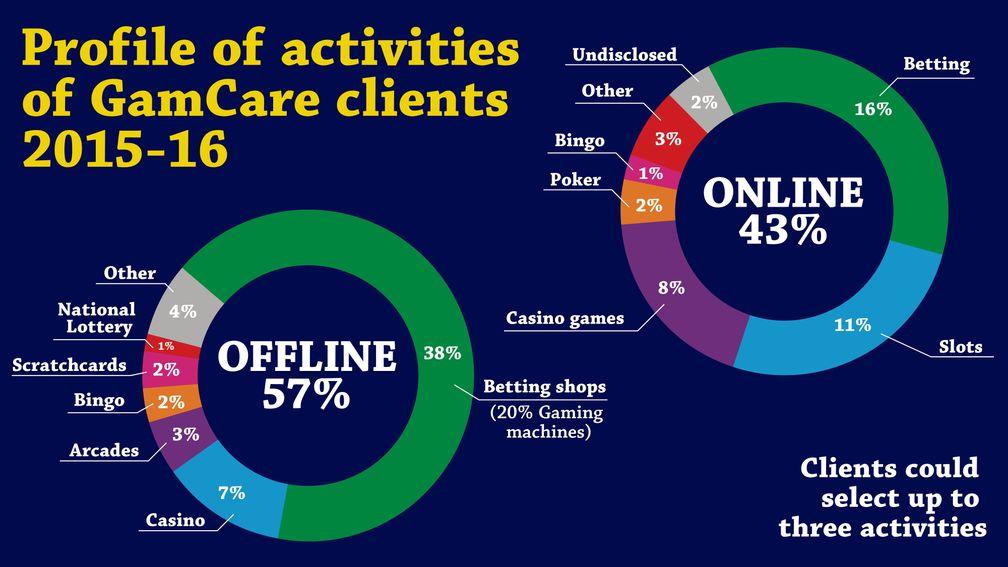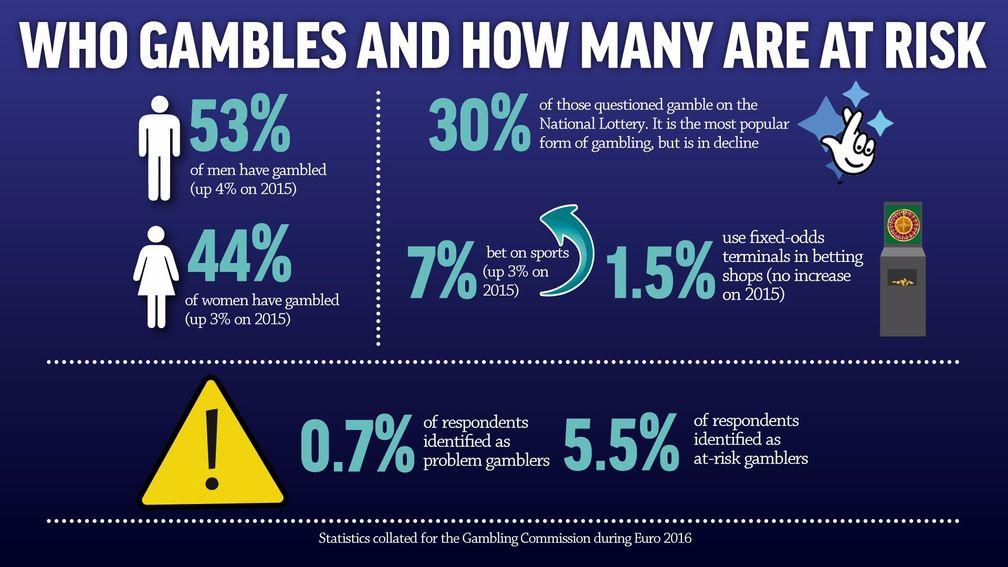Never too old to get in trouble nor too late to seek help

First published in October 2017
The statistics compiled by GamCare based on clients who used its services in 2015-16 confirmed what many suspected that it is younger, less experienced gamblers who are seeking treatment after getting into difficulties.
Its figures show 21 per cent of its clients were in the 18-25 age range and a further 41 per cent aged between 26-35, so 62 per cent were 35 and under. In comparison, only 6% were 56 and over, which could mean the greybeards are wise enough not to get into trouble or are unwilling to seek counselling.
To illustrate that it is possible to get into difficulties with gambling at any stage of your betting life and never too late to admit you need help, 16 per cent of GamCare clients had been gambling for 20 years or more.
The levels of debt revealed by those seeking GamCare's advice showed that while 20 per cent had nothing to pay off and 18 per cent had less than £5,000 debt, some 7 per cent had debt of between £20,000-£100,000, although whether this could be wholly attributable to gambling is unclear.
John Cobb speaks to the chairman of the Industry Group for Responsible Gambling
A lower percentage of clients seeking help listed online (43 per cent) as their area of activity, with online sports and racing betting comprising 16% of the overall total, while of the 57% who gambled offline there was a strong tilt towards betting shops at 38%, compared to casinos at 7%. Some 20% of the total listed gaming machines in betting shops as one of their activities.
For advice and support contact Begambleaware or GamCare through their websites or via the national gambling helplines: 0808 8020 133 in the UK, 08000 886 725 in Northern Ireland, where the organisation is Dunlewey.net, or 1800 936 725 in the Republic of Ireland to get into contact with problemgambling.ie.
Ten tips to help keep your betting in check
One of the key aims of Responsible Gambling Week was to provide punters with strategies that enable them to control their betting, to restore the enjoyment they might once have had from gambling rather than the painful experience it can become.
For those who may be starting out on a lifetime of betting this advice is even more important as it provides the sort of instruction that too many punters have to learn the hard way.
An important resource in the education of punters is the betting industry-supported website begambleaware.org which has, among many useful pages, a ten-step guide on how to bet with restraint.
As their guide points out, “most people gamble for fun and enjoyment but some think of gambling as a way to make money, spend more than they can afford, or use gambling to distract themselves from everyday problems”. The term ‘reality check’ may be overused, but that is what they provide. Here are their top tips.
1. Don’t think of gambling as a way to make money
The venue [betting shop, casino, etc] is using gambling to make money. It’s not designed to work the other way around. Over time you will lose more money than you receive. Think of it as an entertainment expense – just like buying a cinema ticket.
2. Gamble only with money you can afford to lose
Gamble within your entertainment budget, not with your phone bill or rent budget.
3. Set a money limit in advance
Decide how much you can afford to lose before you go to play. When it’s gone – it’s over. If you win, you’ve been lucky, but don’t be disappointed if your luck doesn’t continue.
4. Set a time limit in advance
It’s easy to lose track of time when you’re gambling. Set a time limit or alarm, and when time’s up – quit! Odds are that the longer you spend gambling the more you will lose.
5. Never chase your losses
If you lose your set money limit and then try to win some of it back then you haven’t really set a money limit. Chasing your losses will usually just lead to bigger and bigger losses.
6. Don’t gamble when you’re depressed or upset
Decision-making is more difficult when you’re stressed or emotionally upset. Make sure you gamble only when you’re happy and clear headed.
7. Balance gambling with other activities
When gambling becomes your only form of entertainment it’s unlikely you’re gambling for the fun of it and it may be a problem. Make sure gambling isn’t your only pastime
8. Don’t bring your bank card
This is a good way to safeguard your money limit and not let being ‘in the moment’ warp your judgment.
9. Take frequent breaks
Gambling continuously can cause you to lose track of time and perspective. Step out for some air or a bite to eat at regular intervals.
10. Don’t drink or use drugs when gambling
Drugs and alcohol cloud judgement, and good judgement stands as your main line of defence against letting gambling get out of control.

Are you the type of gambler waiting for just one big win?
Gamcare, the primary source of advice for those with gambling difficulties, uses the experiences of those it assists to analyse how and why people slip into trouble.
One of the key questions asked is: "Why do I do it?" There is rarely a simple answer, as with any activity that puts people through turmoil, the obvious response of simply stopping is often not viewed as an option. Gambling problems are seen as being outside their control – something that is happening to them rather than something they can fix.
So why do they continue? The obvious answer is "for the money", but Gamcare asks punters to challenge that response: "When you win, do you spend your winnings on more gambling? Do you continue to gamble until you have little or no money left?" Many gamblers feel they are waiting for the 'big win', which seems tantalisingly close. However, the reality is that scooping the big pot simply fuels their desire for more gambling.
It might not be easy to work out by yourself the underlying reasons for your gambling. Getting professional help can start to unpick things. Contact Gamcare or call the national gambling helplines: 0808 8020 133 in the UK, 08000 886 725 in Northern Ireland, or 1800 936 725 in the Republic of Ireland.
Tools to help you stay responsible when gambling
A guide by the Gambling Commission (gamblingcommission.gov.uk) has a reminder of tools provided by reputable gambling businesses. Here is a checklist:
Setting limits on gaming machines
If you are playing a gaming machine in a betting shop you may be able set a limit on how much and how long you can play for. Once you reach these limits you will be given the choice to stop or continue with new limits. Staff behind the counter are alerted when a limit is set or reached, when the machine must provide a 30-second break before you can resume. This gives time for you to think about whether you want to continue. Limits are also available if you play online.
Time-outs
An online time-out can be used if you want to be able to continue to gamble, but block yourself from it for a period. Online gambling companies must offer this facility for the following periods: 24 hours; one week; one month; or any period a customer might reasonably request up to a maximum of six weeks.
Self-exclusion
If you think you are spending too much time or money gambling you can ask to be self-excluded. This lasts at least six months and, while it is up to you to stick to the agreement, if you try to gamble during that time the company should make efforts to stop you. Once you have made a self-exclusion agreement the gambling company must close your account and return any money in it to you. It must also remove your details from its marketing databases.
What to look at before gambling
Before you transfer money into a gambling account you should check the organisation displays that it is licensed by the Gambling Commission and that you can can click directly through to the GC's public licence register.
Whichever firm you bet with you should check the terms for each gambling product. This will help you understand what you are betting on so you can make an informed decision. And you should check for restrictions on introductory offers or bonuses (such as the minimum spend before a bonus is paid).
Do you chase your losses? Questions every punters should ask themselves
Have you ever bet more than you could really afford to lose?
A - Never
B - Sometimes
C - Most of the time
D - Almost always
Have you needed to gamble with larger amounts of money to get the same feeling of excitement?
A - Never
B - Sometimes
C - Most of the time
D - Almost always
Have you gone back on another day to try to win back money you have lost?
A - Never
B - Sometimes
C - Most of the time
D - Almost always
Have you borrowed money or sold anything to gamble?
A - Never
B - Sometimes
C - Most of the time
D - Almost always
Have you felt you might have a problem with gambling?
A - Never
B - Sometimes
C - Most of the time
D - Almost always
Have people criticised your betting or told you that you had a gambling problem, whether or not you thought it was true?
A - Never
B - Sometimes
C - Most of the time
D - Almost always
Have you felt guilty about the way you gamble or what happens when you gamble?
A - Never
B - Sometimes
C - Most of the time
D - Almost always
Has your gambling caused you any health problems, including stress or anxiety?
A - Never
B - Sometimes
C - Most of the time
D - Almost always
Has your gambling caused any financial problems for you or your household?
A - Never
B - Sometimes
C - Most of the time
D - Almost always
If you answered A to most, or all questions then you don't show signs of a gambling problem; if you answered B to most questions then you show low-level problems with few identified negative consequences; if your answers were mainly in the C and D categories that suggests you might be experiencing problems with your gambling.
These Begambleaware questions have more detailed analysis on their website where you can obtain support through a confidential help page. You can also contact Gamcare for further information or call the National Gambling Helpline on 0800 8020 133 in the UK, 08000 886 725 in Northern Ireland, where the organisation is Dunlewey.net, or 1800 936 725 in the Republic of Ireland to get into contact with problemgambling.ie.
Published on inRP Classics
Last updated